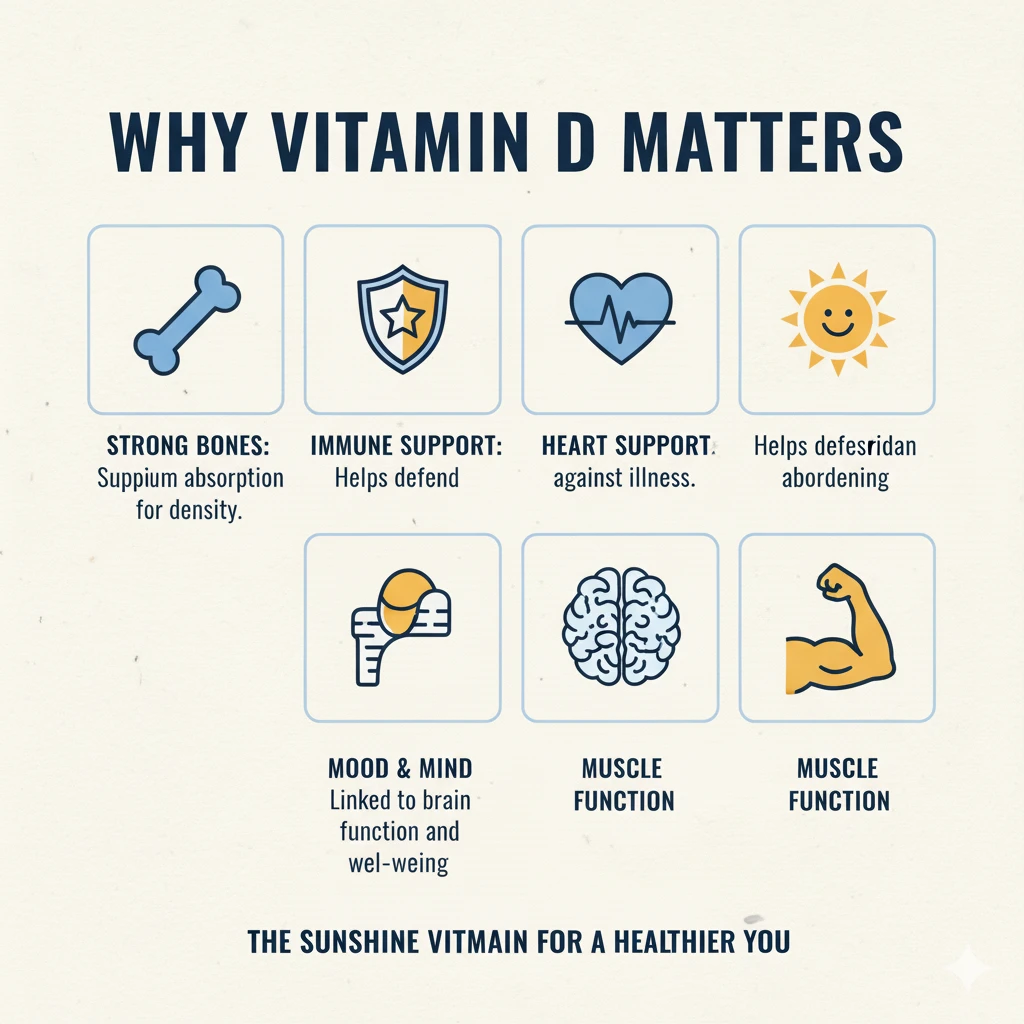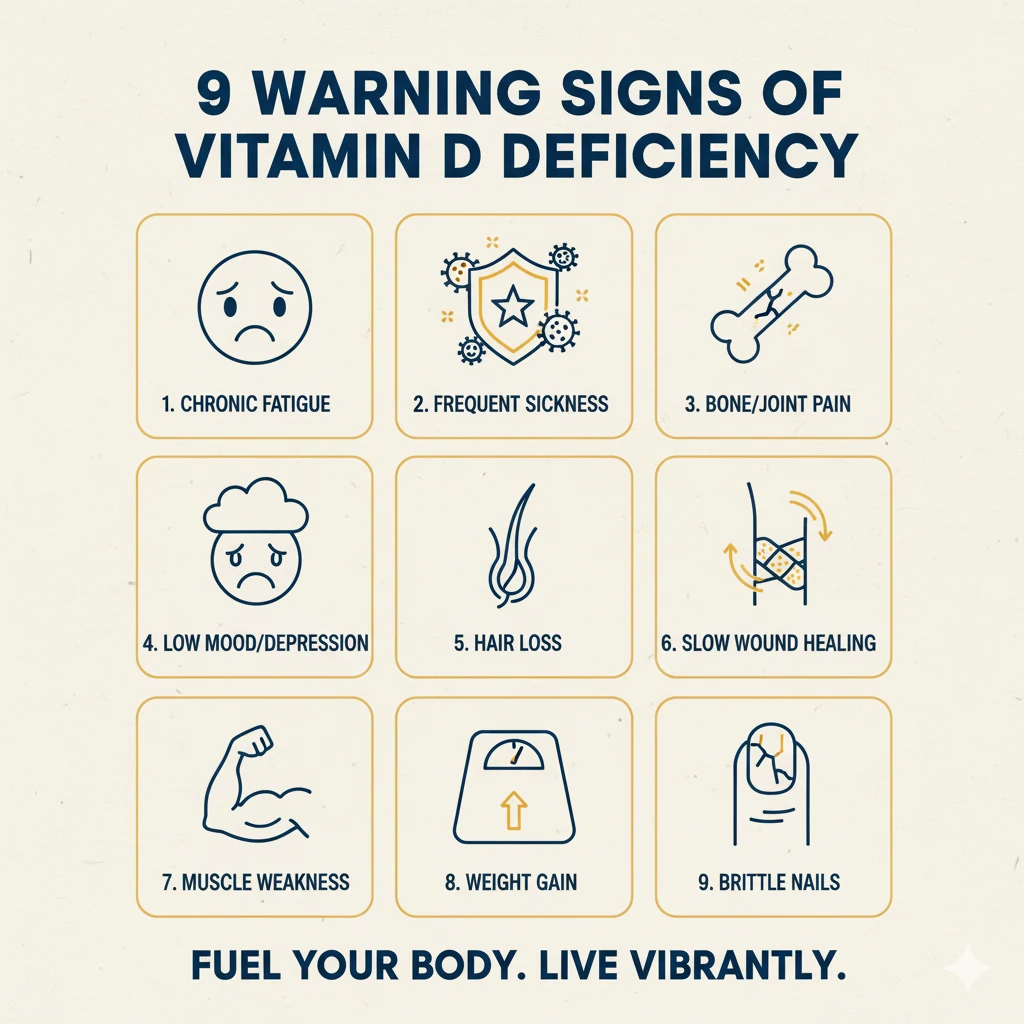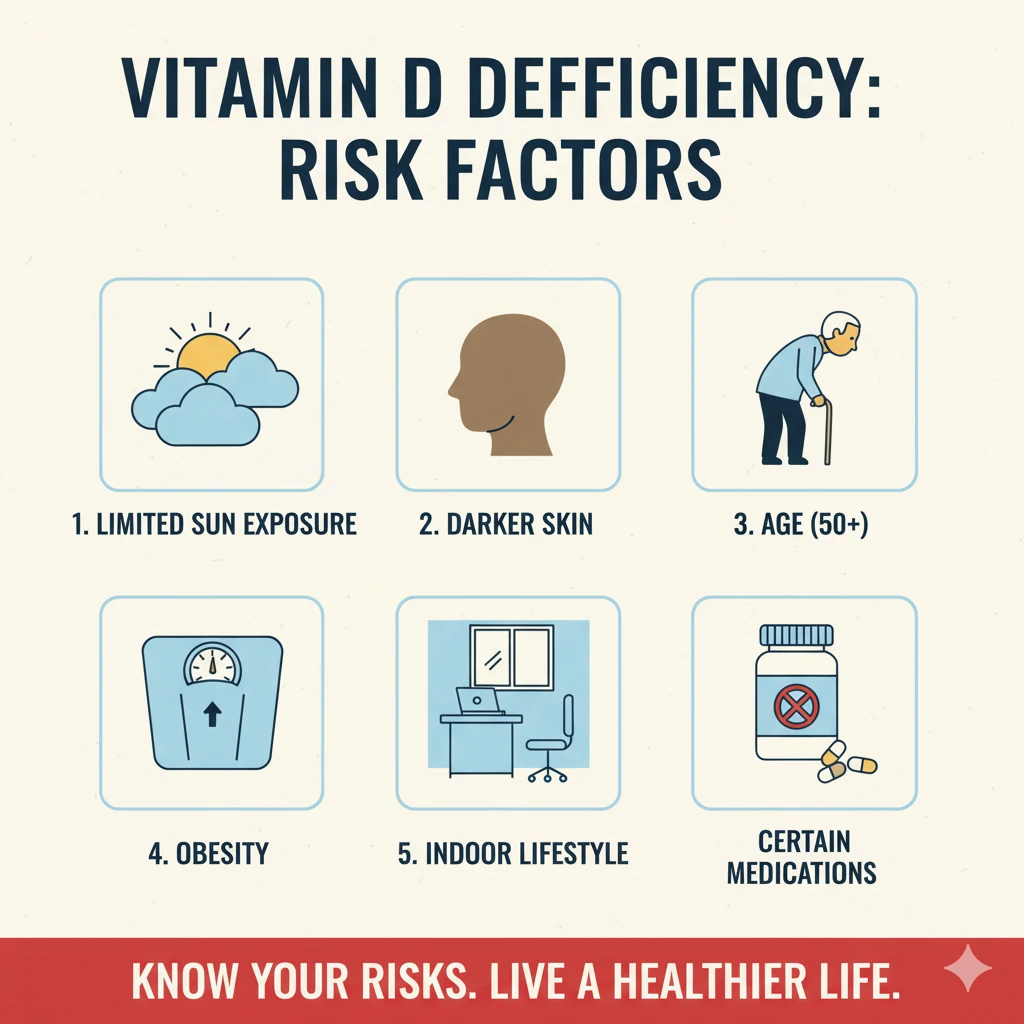Feeling tired, moody, or achy lately? You might be missing something essential — Vitamin D, often called the “sunshine vitamin”. This critical nutrient doesn’t just help build strong bones; it plays vital roles in immune function, mood regulation, hormone balance, and even weight management. Yet despite its importance, Vitamin D deficiency is surprisingly common, affecting people of all ages around the world.
The problem? Many people don’t realize they’re deficient because the symptoms can be subtle and easily attributed to stress, aging, or simply being too busy. You might dismiss persistent fatigue as lack of sleep, or blame bone pain on getting older, when the real culprit is inadequate Vitamin D levels. Left unchecked, chronic deficiency can lead to serious complications including osteoporosis, weakened immunity, depression, and increased risk of chronic diseases.

Here are 9 warning signs that your body may be low in Vitamin D — and how to fix it before it affects your health.
Why Vitamin D Is So Important

Vitamin D is unlike most vitamins because your body can actually produce it when your skin is exposed to sunlight. Often referred to as the “sunshine vitamin,” Vitamin D functions more like a hormone, affecting cells throughout your entire body.
Here’s what this essential nutrient does for your health:
Supports strong bones and teeth: Vitamin D is crucial for calcium absorption in the gut, ensuring your bones and teeth receive the minerals they need to stay strong.
Regulates calcium and phosphorus balance: It helps maintain proper levels of these minerals in your bloodstream, preventing dangerous imbalances.
Boosts immune system function: Vitamin D modulates your immune responses by controlling the growth and differentiation of immune cells like T-cells, B-cells, and macrophages, helping you fight off infections more effectively.
Supports mood and mental health: Research shows Vitamin D plays an important role in regulating mood and reducing the risk of depression.
Promotes muscle strength: This vitamin helps maintain muscle function and reduces the risk of falls, especially in older adults.
Supports cardiovascular health: Adequate Vitamin D levels contribute to heart health and proper cardiovascular function.
While our bodies are designed to produce Vitamin D through sun exposure, many people don’t get enough sunlight — especially those living in northern climates, working indoors, or with darker skin tones. This makes dietary sources and supplements increasingly important for maintaining optimal levels.
9 Warning Signs You Might Be Vitamin D Deficient

Most people with Vitamin D deficiency don’t notice obvious symptoms at first. However, your body does send signals when levels drop too low. Here are the nine most common warning signs to watch for:
1. Constant Fatigue and Low Energy
If you wake up tired even after a full night’s sleep, low Vitamin D might be the reason. This isn’t ordinary tiredness — it’s profound exhaustion that makes even basic tasks feel overwhelming.
Vitamin D helps your body convert food into energy and supports muscle function. When levels drop, your body struggles to maintain normal energy production, leaving you drained and unmotivated. Many people slowly lose vitamin levels over time without realizing it and blame their fatigue on the hustle and bustle of everyday life.
➡️ What to do: Spend 10-30 minutes in direct sunlight daily, and check your Vitamin D levels with a simple blood test. Your doctor can determine if supplementation is needed.
2. Frequent Illnesses or Weakened Immunity
Do you catch every cold and flu that goes around? Vitamin D plays a crucial role in supporting your immune system’s ability to fight off bacterial and viral infections.
Research shows that Vitamin D helps control the growth and activity of various immune cells, essentially training your body’s defense system to respond more effectively to threats. When levels are low, you become more susceptible to frequent infections and may take longer to recover from illnesses.
➡️ What to do: Include Vitamin D-rich foods like fatty fish (salmon, mackerel, sardines), egg yolks, and fortified milk in your diet. Consider a supplement if you’re frequently sick.
3. Bone Pain, Joint Pain, or Lower Back Pain
Chronic pain, especially in the lower back, hips, legs, or ribs, can be directly linked to Vitamin D deficiency. This happens because Vitamin D is essential for calcium absorption — without enough of it, your bones don’t receive the minerals they need to stay strong and healthy.
People of all ages can experience worsening bone health with low Vitamin D levels. Many older patients blame their age for joint pains when Vitamin D deficiency may be making their discomfort significantly worse.
➡️ What to do: Talk to your doctor about Vitamin D supplementation if you experience persistent bone or joint pain. A blood test can confirm deficiency.
4. Mood Changes, Depression, or Seasonal Sadness
Low Vitamin D levels are strongly linked to mood disorders, including depression and seasonal affective disorder. Research involving 7,534 people found that those experiencing negative emotions who received Vitamin D supplements noticed significant improvements in their symptoms.
Vitamin D receptors are present throughout the brain, particularly in areas that regulate mood. When deficiency occurs, it can trigger depressive symptoms, anxiety, irritability, and emotional instability.
➡️ What to do: Get daily sunlight exposure, especially during winter months, and consider a Vitamin D3 supplement after consulting with your healthcare provider.
5. Hair Loss or Thinning Hair
Experiencing more hair loss than usual? While many factors can contribute to hair thinning, Vitamin D deficiency can affect hair follicle health, leading to noticeable hair loss.
Vitamin D plays a role in stimulating hair follicles and promoting the hair growth cycle. When levels drop, follicles may enter a resting phase prematurely, resulting in increased shedding and slower regrowth.
➡️ What to do: Improve your overall nutrition by including Vitamin D-rich foods, and check hormone balance with your doctor to rule out other causes.
6. Slow Wound Healing
If your cuts, bruises, and injuries take longer to heal than they should, Vitamin D deficiency might be to blame. This vitamin plays an important role in tissue repair and inflammation control.
Research shows that Vitamin D helps create compounds that are crucial for forming new skin during the wound-healing process. Without adequate levels, your body’s natural repair mechanisms slow down significantly.
➡️ What to do: Ensure you’re getting enough Vitamin D through sunlight, diet, and supplements if recommended by your doctor.
7. Muscle Weakness, Aches, or Cramps
Are you experiencing unexplained muscle weakness, frequent aches, or cramps — especially in your legs, thighs, or upper arms? Vitamin D receptors have been linked to pain-sensing receptors throughout the body.
Low Vitamin D can lead to reduced muscle strength, increased muscle soreness, and a higher risk of falls. Studies show that Vitamin D supplements can help reduce fall risk by improving muscle strength and function.
➡️ What to do: Have your Vitamin D levels tested, and discuss supplementation with your healthcare provider. Vitamin D can improve muscle strength when levels are restored.
8. Weight Gain or Difficulty Losing Weight
People with higher body weights have a greater chance of low Vitamin D levels, and research suggests there may be a connection between Vitamin D deficiency and obesity. Vitamin D affects metabolism and insulin sensitivity, both of which influence weight management.
While current research doesn’t prove that Vitamin D causes weight loss, studies show that people taking daily calcium and Vitamin D supplements lost more weight than those taking a placebo, possibly due to an appetite-suppressing effect.
➡️ What to do: Maintain a healthy, balanced diet and regular exercise routine while ensuring adequate Vitamin D intake. Consider testing if you’re struggling with unexplained weight gain.
9. Brittle Nails, Weak Teeth, or Bone Loss
A lack of Vitamin D reduces your body’s ability to absorb calcium, which directly impacts the strength of your nails, teeth, and bones. You might notice nails that break easily, dental problems, or a diagnosis of osteoporosis or osteopenia.
In children, severe Vitamin D deficiency can cause rickets — a condition that softens and weakens bones. In adults, chronic deficiency leads to osteomalacia (bone softening) and osteoporosis (bone loss), significantly increasing fracture risk.
➡️ What to do: Get a bone density scan if you’re at risk for osteoporosis, and work with your doctor to optimize your Vitamin D levels.
Common Causes of Vitamin D Deficiency

Understanding why deficiency occurs can help you take preventive action. Here are the most common causes:
Limited sunlight exposure: Spending most of your time indoors, living in northern latitudes, or winter months with reduced daylight dramatically limit Vitamin D production.
Darker skin tone: People with darker skin have higher melanin levels, which reduces the skin’s ability to produce Vitamin D from sunlight. Dark-skinned individuals need more sun exposure to produce the same amount of Vitamin D as lighter-skinned people.
Age: As you get older, your skin becomes less efficient at producing Vitamin D, and your kidneys become less able to convert it to its active form.
Obesity: Body fat binds to Vitamin D and prevents it from entering the bloodstream, making it more difficult for people with higher body weights to maintain adequate levels.
Poor diet: Not consuming enough Vitamin D-rich foods like fatty fish, egg yolks, and fortified dairy products contributes to deficiency.
Digestive conditions: Disorders like Crohn’s disease, celiac disease, and ulcerative colitis impair the body’s ability to absorb Vitamin D from food.
Kidney or liver disease: These organs convert Vitamin D into its active, usable form, so chronic disease affecting them can lead to deficiency.
Certain medications: Some cholesterol-lowering drugs, anti-seizure medications, steroids, and weight-loss drugs can interfere with Vitamin D absorption or metabolism.
If you have one or more of these risk factors and experience symptoms, talk to your healthcare provider about testing.
How to Boost Your Vitamin D Naturally

The good news is that Vitamin D deficiency is easily correctable with a few simple lifestyle changes. Here are six effective strategies to increase your levels naturally:
Get 10-30 Minutes of Sunlight Daily
Your skin produces Vitamin D when exposed to UVB rays from the sun. Just 10 to 30 minutes of direct sunlight exposure on your arms, legs, or back several times per week can significantly boost your levels.
The amount of Vitamin D you produce depends on your skin tone, geographic location, time of year, and time of day. People with darker skin need more sun exposure than those with lighter skin. Aim for midday sun when UVB rays are strongest, but avoid prolonged exposure that could damage your skin.
Eat Vitamin D-Rich Foods
Incorporate these natural food sources into your diet regularly:
Fatty fish: Salmon, mackerel, sardines, tuna, and anchovies are among the richest sources, with a 3-ounce serving of salmon providing up to 570 IU.
Egg yolks: One large scrambled egg contains approximately 44 IU of Vitamin D.
Mushrooms: The only vegetarian whole-food source of Vitamin D, especially varieties treated with UV light.
Fortified foods: Many dairy products, plant-based milks, orange juice, and cereals are fortified with Vitamin D.
Consider High-Quality Supplements
If you can’t get enough Vitamin D from sunlight and diet alone, supplements are an effective solution. Vitamin D3 (cholecalciferol) is more easily absorbed by your body than Vitamin D2 (ergocalciferol) and is available over-the-counter.
Typical adult dosages range from 600 to 2000 IU daily, though your doctor may recommend higher doses if you’re deficient. Always consult with a healthcare provider before starting supplementation to determine the appropriate dosage for your needs.
Pair Vitamin D with K2 and Magnesium
For optimal absorption and effectiveness, take Vitamin D alongside Vitamin K2 and magnesium. Vitamin K2 helps direct calcium to your bones and teeth while preventing it from accumulating in arteries. Magnesium is essential for activating Vitamin D in your body.
Many experts recommend taking 90-110 mcg of Vitamin K2 daily when supplementing with Vitamin D3. This synergistic combination ensures calcium is properly utilized throughout your body.
Maintain a Healthy Weight
Since obesity can interfere with Vitamin D utilization, maintaining a healthy weight through balanced nutrition and regular exercise supports better Vitamin D status.
Limit Factors That Block Production
While sunscreen and protective clothing are important for preventing skin cancer, be aware that they can reduce Vitamin D production. Consider getting brief sun exposure before applying sunscreen, or discuss supplementation with your doctor if you always use protection.
When to See a Doctor
Most people with Vitamin D deficiency don’t have obvious symptoms, which is why testing is so important. Consider seeing your healthcare provider for a blood test if you:
Experience multiple symptoms listed above
Have risk factors such as limited sun exposure, darker skin, obesity, or chronic health conditions
Are over age 65, when deficiency becomes more common
Take medications that may interfere with Vitamin D absorption
The most common test is the 25-hydroxy Vitamin D blood test. Here’s how to interpret the results:
Deficient: Less than 20 ng/mL
Insufficient: 20-30 ng/mL
Adequate: 20-50 ng/mL (many experts recommend 30-50 ng/mL for optimal health)
High: Above 50 ng/mL
Your doctor will recommend appropriate treatment based on your levels, which may include dietary changes, increased sun exposure, and/or prescription-strength supplements. Regular monitoring ensures your levels return to and remain in the healthy range.
Conclusion
Vitamin D deficiency is one of the most common nutritional deficiencies worldwide, yet it’s also one of the easiest to fix. If you’ve been experiencing persistent fatigue, frequent illnesses, bone pain, mood changes, hair loss, slow healing, muscle weakness, unexplained weight gain, or brittle nails and teeth, your body may be telling you it needs more Vitamin D.
The good news? With just a few simple lifestyle adjustments — spending more time in sunlight, eating Vitamin D-rich foods, maintaining a healthy weight, and taking quality supplements when needed — you can restore your levels and start feeling better. Listen to your body’s warning signals, get tested if you have symptoms or risk factors, and work with your healthcare provider to create a plan that works for you.
With just a few simple changes, you can restore your Vitamin D levels — and your energy, mood, immunity, and overall vitality.

Leave a Reply